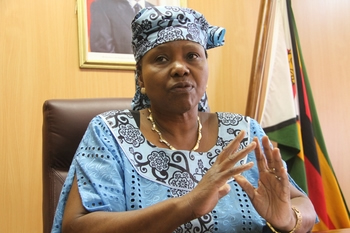ZimParks board dismissal: Is it enough?

Jeffrey Gogo Climate Story
Environment Minister Oppah Muchinguri Kashiri, last Thursday sacked the eight-member Zimbabwe Parks and Wildlife Management Authority (ZimParks) board of directors for misconduct, including abuse of office and poor corporate governance.
Good move. Very good. But is it enough?
An expert on law from Harare told The Herald Business that offences by the ZimParks board, chaired by Tichafa Mundangepfupfu, “border mostly on misconduct at the work place”, when asked whether there was an element of criminality in the charges brought against the directors.
“There is no criminal element involved, which can hold water in a court of law,” said the expert who cannot be named for professional reasons.
Mundangepfupfu and his board took office five years ago, but have faced criticism for presiding over a litany of scandals at the wildlife body, including the alleged theft of rhino horn worth $3 million.
According to the charge sheet, Mundangepfupfu is accused of leading a board that facilitated insider non-performing loans for some directors, taking over the day-to-day running of the Authority, turning a blind eye to prudent corporate governance practices, and other issues.
With criminal misconduct, said the law expert, it was not enough to prove the act, one had to prove intent as well. And these issues could prove tricky in the Mundangepfupfu etal case, were Minister Muchinguri Kashiri to prefer criminal charges against the eight.
“There would need to be a violation of law which attracts a criminal sanction or penalty, in respect of which the essential components of a crime — the mental and physical elements — can be proved,” said the lawyer.
“One also has to be mindful of when the conduct took place and the circumstances: was that statute in force, were there old policies or resolutions or approvals in place that made such practices lawful, was it done in good faith or with intent to defraud or unlawfully profit or to abuse office to secure an unlawful gain etc.”
He continued: “Key document would be the audit report (Auditor General’s) and it’s actual findings or fact not mere opinion and whether that establishes criminality at law. Mere overstepping of mandate is not necessarily criminal without establishing the legal and factual elements of the crime being alleged.”
Perhaps that explains why the dismissals appear the only plausible option for Mrs Muchinguri Kashiri to deal with a group of public office bearers that overstepped their mandate, probably with the knowledge they could get away with murder.
So, in that sense, sacking looks like is enough.
Morally wrong
But morally, it isn’t. It is evident that not enough had been done to reform the corporate culture that led to the alleged insider deals involving 56 rhino horns with a street value of more than $3 million, unmasked in an audit at the Wildlife Authority last year.
That matter is now at the courts, with former ZimParks director-general Edson Chidziva — fired for allegedly concealing the shady deal – and two other junior staffers facing lengthy jail terms if convicted.
Trade in rhino horn is banned globally to protect the animal, which is at risk of extinction. All trade has gone underground following the 40-year-old ban.
It is ironic that Tichafa Mundangepfupfu, the ZimParks chairperson fresh from being fired, was leading the charge against Chidziva, taking a stand in court to insist that the former director-general had a case to answer in the $3 million rhino horn heist. A case of the pot calling the kettle black!
Mrs Muchinguri Kashiri is now hoping that her axing of the board will restore order at ZimParks, a quasi-Government body that oversees the management and protection of strategic national resources including wild animals and national reserves and parks, key tourist draw cards. But there is also that aspect that some of the actions by board members of parastatals or State-owned enterprises may have been authorised by parent ministries or policies, off or on record, prior to the new Act on corporate governance relating to public entities.
For example, it is common cause many a board member have taken flak for standing aloof in the collapse of parastatals and State enterprises, where alleged pilferage, corruption and racketeering had taken root. Directors were thus encouraged to become more active and effective in the management of State companies to prevent failure.
By taking on active roles at ZimParks, Mundangepfupfu can claim to have been acting in good faith, even though the end result proved costly. It is a complex web of events that can be difficult to handle for the Environment Minister except firing those accused.
Even the loans issue looks like common-place, with unsanctioned inter-parastatal loans prevalent in recent years. It all depended on who was boss in which ministry.
The Office of the President and Cabinet is now trying to clean up the mess. It has started to train public enterprise board directors on good corporate governance in a bid to exorcise the ghost of old.
In the public eye, it is disappointing that agents of Government, representing Government interests on State enterprise boards and parastatals can steal public funds under the guise of good faith and established practice and getting away with simply a sacking from their job. Surely, more can be done.
God is faithful.










Comments